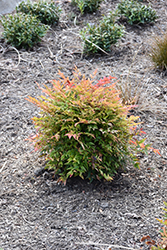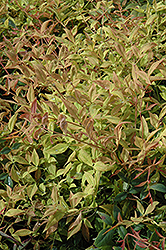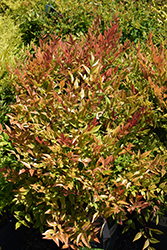It's all about ...
plants

Gulf Stream Dwarf Nandina
Nandina domestica 'Gulf Stream'
Height: 3 feet
Spread: 3 feet
Sunlight:
![]()
![]()
![]()
Hardiness Zone: 6b
Other Names: Heavenly Bamboo
Description:
Amazing foliage throughout the season, from copper in spring to blue-green, red and gold during summer, then copper again in the fall; excellent in mass plantings for textural effect; seldom flowers in cooler climates
Ornamental Features
Gulf Stream Dwarf Nandina is primarily valued in the garden for its interestingly mounded form. It has attractive bluish-green foliage with red stripes and tinges of gold which emerges coppery-bronze in spring. The narrow compound leaves are highly ornamental and turn an outstanding coppery-bronze in the fall, which persists throughout the winter.
Landscape Attributes
Gulf Stream Dwarf Nandina is a dense multi-stemmed evergreen shrub with a mounded form. Its relatively fine texture sets it apart from other landscape plants with less refined foliage.
This shrub will require occasional maintenance and upkeep, and is best pruned in late winter once the threat of extreme cold has passed. It has no significant negative characteristics.
Gulf Stream Dwarf Nandina is recommended for the following landscape applications;
- Mass Planting
- Border Edging
- General Garden Use
- Groundcover
- Container Planting
Planting & Growing
Gulf Stream Dwarf Nandina will grow to be about 3 feet tall at maturity, with a spread of 3 feet. It tends to fill out right to the ground and therefore doesn't necessarily require facer plants in front. It grows at a medium rate, and under ideal conditions can be expected to live for approximately 30 years.
This shrub performs well in both full sun and full shade. However, you may want to keep it away from hot, dry locations that receive direct afternoon sun or which get reflected sunlight, such as against the south side of a white wall. It does best in average to evenly moist conditions, but will not tolerate standing water. It is not particular as to soil type or pH. It is highly tolerant of urban pollution and will even thrive in inner city environments. This is a selected variety of a species not originally from North America.
Gulf Stream Dwarf Nandina makes a fine choice for the outdoor landscape, but it is also well-suited for use in outdoor pots and containers. Because of its height, it is often used as a 'thriller' in the 'spiller-thriller-filler' container combination; plant it near the center of the pot, surrounded by smaller plants and those that spill over the edges. It is even sizeable enough that it can be grown alone in a suitable container. Note that when grown in a container, it may not perform exactly as indicated on the tag - this is to be expected. Also note that when growing plants in outdoor containers and baskets, they may require more frequent waterings than they would in the yard or garden. Be aware that in our climate, most plants cannot be expected to survive the winter if left in containers outdoors, and this plant is no exception. Contact our experts for more information on how to protect it over the winter months.
This plant is not reliably hardy in our region, and certain restrictions may apply; contact the store for more information.


